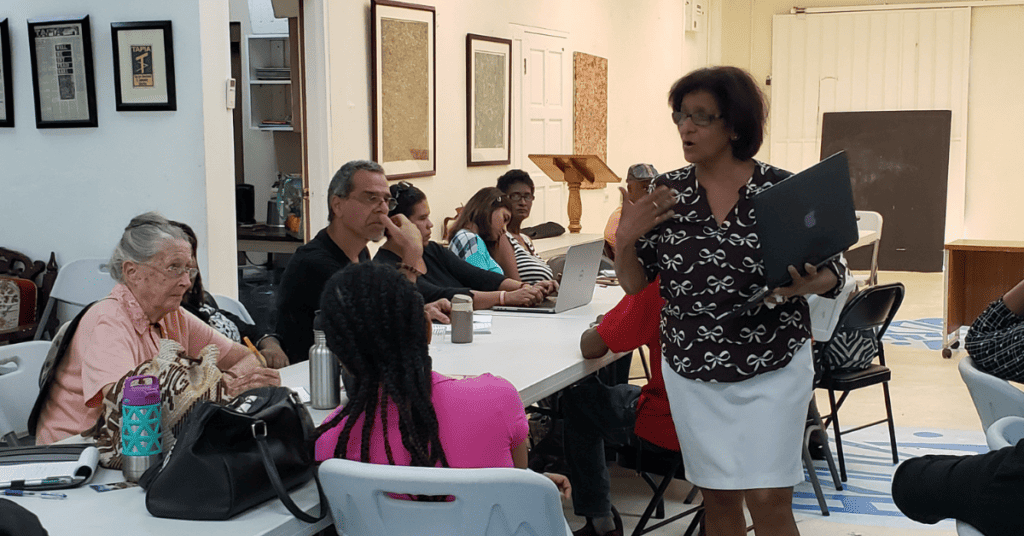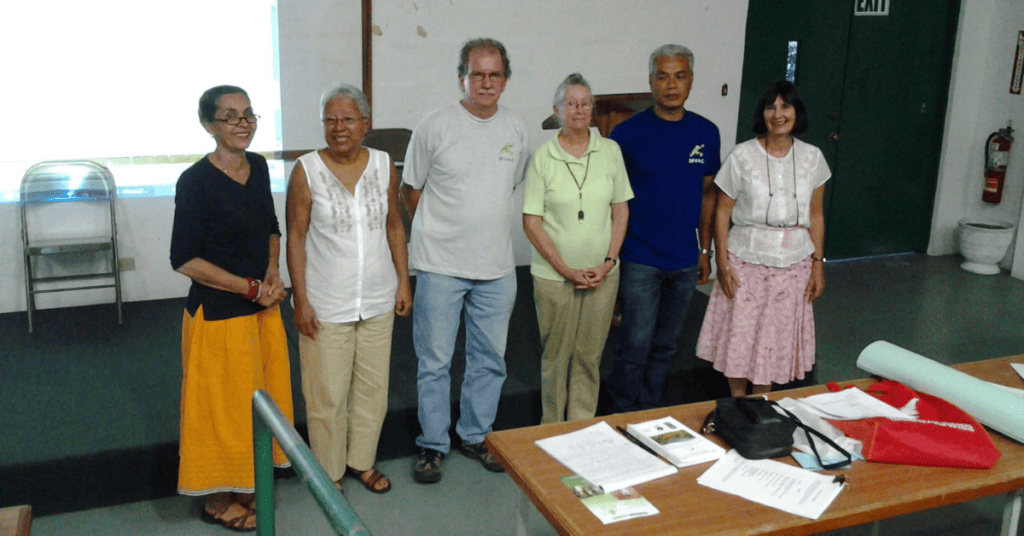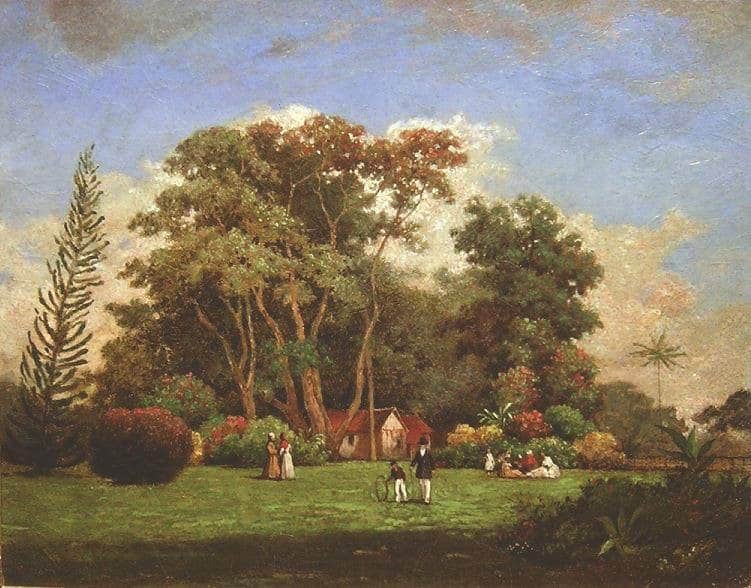In 1967, Patricia McGaw and her husband embarked on a 10-day trip across the Atlantic Ocean. Their destination: the island of Trinidad, where Mr. McGaw was to set to take up a three-year teaching contract with the Faculty of Engineering at the University of the West Indies, St. Augustine (UWI). Now living in Trinidad and Tobago for over 50 years, Mrs. McGaw, known to everyone as Pat, continues to be a tireless advocate for good environmental management in T&T.
Patricia McGaw was born in Scotland, the daughter of a civil engineer whose job would carry her family to live in different parts of their homeland. Her active lifestyle traces back to her youth in which she swam competitively and competed in the finals of a breaststroke event in the East of Scotland Junior Championships at the age of 15. She played hockey, badminton, squash and did Scottish country dancing and ballroom dancing, while also enjoying hillwalking in the UK countryside with her husband.
Pat has always worked in the field of science. She used her background in Mathematics, Physics and Chemistry to work at a laboratory in the United Kingdom where they were developing terylene, a synthetic polyester fibre which was invented in Britain in the 1940s. Pat recalls that in those days people were looking at manufacturing synthetic products in order to reduce the use of natural resources.
In Trinidad, she worked as a Laboratory Demonstrator in Chemistry at UWI, a job that she held until the early 2000s. The part-time nature of the job afforded her the time to devote to caring for her two children and to support her husband’s study for a PhD. Pat reminisces on UWI in the early days, saying that “at the time there were only four Departments in the Faculty of Engineering. Everyone knew everyone. We were a small, close-knit community that was dedicated to doing what was best for the students; at that time student numbers were less than 1,000. We all knew each other and worked well together. We all worked hard, but UWI was also a fun place.”
Over time, she expanded her activities from homemaking and education to working in environmental non-governmental organisations (NGO’s). Pat is a founding member of The Friends of Botanic Gardens of Trinidad and Tobago (FOBG) and Maracas Valley Action Committee (MVAC) and she has been a member of the Council of Presidents of the Environment (COPE) for over 15 years. She is currently the secretary of all three NGO’s. Pat believes a secretary is important because it is “the communication channel of an organisation“ and ensures that the organisation is accurate in what is does and says.

She notes that each group was formed to meet a specific need. MVAC was created to address the irresponsible development in Maracas Valley, coming to a head when “an electrical contractor had cut into the hillside in the Valley and the erosion was causing chaos.” Pat and three others from Alta Gracia called a meeting concerning the issue and people from every part of the valley turned up. “What was happening was affecting the whole valley…what happens to one end of the valley can affect the entire Valley” she declared. Since then, MVAC has had representatives from every group in Maracas Valley.

One of their major milestones was conducting a project on sustainable development in the Valley that was funded by The Global Environment Facility’s Small Grants Program. It produced a report that quantified many of the issues in the community. They mapped changes in land use from 1970 to 2009, collected data on water quality, did traffic counts, looked at quarrying and at Environmental Impact Assessments (EIAs) and Certificates of Environmental Clearance (CECs). “At the time, CECs were being granted without EIAs so each development was being looked at in isolation,” and therefore started advocating for Environmental Impact Assessments to be required before CEC’s are granted.
The Royal Botanic Gardens, Trinidad, is a 200-year old institution. It is not only a showcase for plants from all over the world but was originally a centre for research and development on agricultural crops in Trinidad & Tobago, including the development of different strains of sugar cane and high-income earning crops. Pat reflected on its history saying, “the Superintendents in charge of the Gardens were botanists and gardeners. They traveled all over Trinidad on horseback collecting plants.” They also visited Tobago, other West Indian islands, Central and South America to collect and exchange plant material and exchange information.

In 1908, The Botanic Gardens merged with the Government Laboratory, the River Estate in Diego Martin and the St. Augustine Nursery to form the Department of Agriculture. T&T’s Botanic Gardens, like those the world over, are important sites for the conservation of plant species. To help reinforce the value of our Botanic Gardens, in 1999, Pat and some members did a project mapping the trees in the gardens. Currently, they are collaborating on an ongoing volunteer project to re-map and identify the plants in the Botanic Gardens.
COPE is an umbrella organisation for environmental NGOs in Trinidad and Tobago. “COPE is the only environmental organisation that brings several interests together because of the variety of members that belong to the group. There is a mutual benefit to all organisations in that there is valuable exchange of ideas and we can speak with a combined voice.” When Mrs. McGaw joined COPE in the early 2000s, she gradually made changes to the administrative structure to improve communication in the organisation. “Minutes were also sent in advance of the meeting and to all member organisations,” she remarked. Pat has continued as secretary since 2010.

Asked about environmental priorities for T&T, she reiterated that we must take a holistic approach to environmental management stating that “we must conserve our natural resources and leave them for future generations. For example, we cannot over-hunt, we need to give nature a chance to recover. There must be balance to make sure that the use of natural resources is not abused.” She also expressed the need to have all-embracing land management and water management authorities that consider environmental factors and all stakeholders in everything that they do. “If there is development on a hillside and you put proper stormwater management in place, little or no silt will reach the river. If it does – you have failed…We also need to have the Escazú Agreement signed.” The Escazu agreement is a Caribbean and Latin America Agreement that seeks to ensure access to information, access to justice and that there is public participation in relation to environmental matters.
Always humble in her work, Pat emphasises that teamwork was responsible for the success of the projects and organisations with whom she has been involved. Nevertheless, through her singular drive and with passion, dedication and hard work, Patricia McGaw continues to make a significant contribution to the conservation of natural resources in Trinidad and Tobago.





